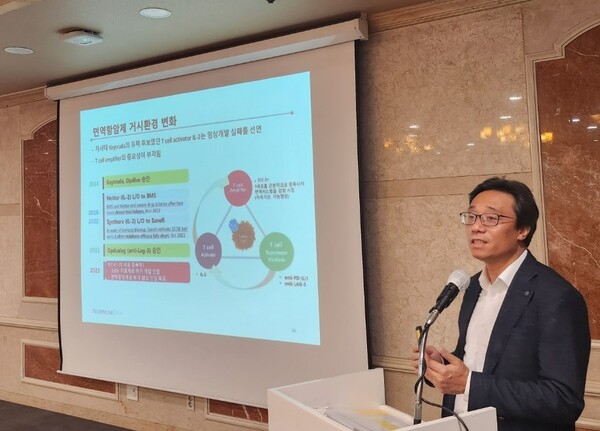NeoImmuneTech said it signed an agreement with the National Institute of Allergy and Infectious Diseases (NIAID), part of the U.S. National Institutes of Health (NIH), to develop NT-I7 (ingredient: efineptakin alfa) to treat acute radiation syndrome (ARS).

"The company expects its first sales if positive results come out during the development procedure," NeoImmuneTech CEO Yang Se-hwan said at a press conference in Seoul on Tuesday.
ARS is an acute illness caused by irradiation of most of the body by a high dose of penetrating radiation in a short period of time. It can damage organs and reduce bone marrow, neutrophils, and lymphocytes, increasing the risk of death due to infection.
"This collaboration agreement is part of the U.S. government's Radiation and Nuclear Countermeasures Program (RNCP)," Yang said. "Under the accord, NeoImmuneTech will provide NT-I7 to NIAID's ARS treatment development research, and NIAID will conduct the research directly."
Because the research is impossible to target patients due to the nature of the disease clinically, two animal experiments are conducted, and NIAID plans to conduct rodent tests, Yang added.
Yang stressed that depending on the results, the company will decide whether to conduct a separate primate test through further discussion with the Biomedical Advanced Research and Development Authority.
"If NIAID confirms positive data in the preclinical study, we expect NeoImmuneTech's first sales will occur by receiving emergency use authorization (EUA) as a Strategic National Stockpile product of the U.S. federal government," Yang said. "The U.S. government has been regularly purchasing and stockpiling drugs that increase neutrophils and platelets after selecting them as national strategic items, respectively."
Although each treatment's stockpile size differs, Yang emphasized that NT-I7 is being discussed as the first candidate for lymphocyte amplification treatment.
"If we succeed in making NT-I7 the first lymphocyte amplification treatment for ARS, it will mean that we have directly verified our substances potential by one of the most authoritative institutions in the U.S., and the value of NT-I7 as an immunotherapy agent will greatly increase," Yang said.

